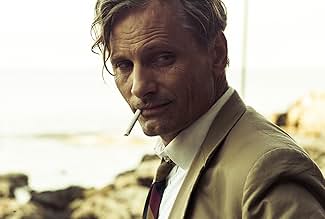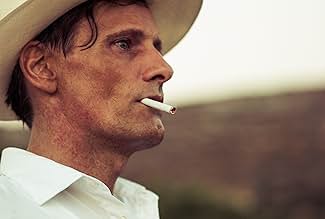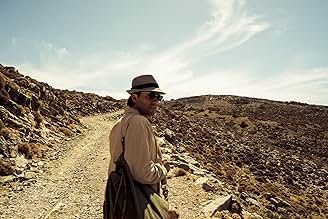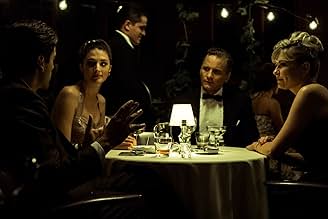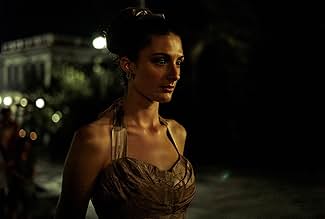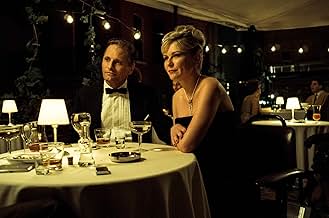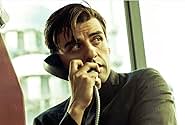PUNTUACIÓN EN IMDb
6,2/10
35 mil
TU PUNTUACIÓN
Un timador, su mujer, y un desconocido dejan Atenas cuando uno de ellos se ve incriminado en la muerte de un detective privado.Un timador, su mujer, y un desconocido dejan Atenas cuando uno de ellos se ve incriminado en la muerte de un detective privado.Un timador, su mujer, y un desconocido dejan Atenas cuando uno de ellos se ve incriminado en la muerte de un detective privado.
- Dirección
- Guión
- Reparto principal
- Premios
- 3 nominaciones en total
Babis Hatzidakis
- Stall Keeper
- (as Babis Chatzidakis)
Stella Fyrogeni
- Barmaid
- (as Stela Fyrogeni)
Reseñas destacadas
If this movie had been made back in mid-century when Alfred Hitchcock and Stanley Donen and Billy Wilder were at their peak, it probably wouldn't get much attention. But given we're in an age where Transformers XVI is a possibility, a movie like this--taut, suspenseful, well-acted, well- written, is kind of a marvel. It doesn't promise a lot: there are no special effects, the plot twists aren't terribly surprising; in fact, nothing in the movie really surprises. But it's all so seamlessly put together, so pleasingly directed, and shot with such loving attention to the scenery, Two Faces is a real delight. Don't come with great expectations--come simply for the pure entertainment of what a movie can be when everything in it works well. (Also, it's based on a Patricia Highsmith novel, so you know that if nothing else, there will be sophistication and wit.)
Film opens at the Parthenon in Athens. A young male guide, played by Oscar Isaac, is guiding some impressionable girls. An older couple enter the scene. The male, played by Viggo Mortensen, is mature. His younger wife, played by Kirsten Dunst, looks like Doris Day. Thus we seem catapulted into the Hitchcock era. Film is in fact set in 1962, and all scenes seem authentic.
A central theme of far too many Hitchcock films to list, is that of an innocent man caught up in events over which he has no control. In this film, however, we quickly find that Mr Mortensen's character is no innocent. He is, however, quickly thrust into events that are out of his control.
Within the central trio of characters, it is unclear what are their individual motives, or, who is trying to con who. The sexual chemistry and tensions remind of 'Knife in the Water' (1962).
Film is a true Hitchcockian-style suspense movie rather than a thriller. As the tension rises so does the music, which also is pure Hitchcockian, and could easily have been lifted in great chunks from one or more of his movies.
As the tension rises, so too does the pace. From the start, the film moves at a decent pace, but this builds as the film progresses, and the pace gets faster and faster. Great camera shots, great chases, and iconic scenes, also suggest homage to 'The Third Man (1949).
All location shooting was superb. This reviewer, once attempting to follow in the footsteps of Plato, got lost in the mountains, and had to be rescued by shepherds. So it was with a fond familiarity that I saw those same mountains.
One explanation for the Hitchcockian-feel to the movie can be explained by the fact that the film is based on a novel by Patricia Highsmith. Alfred Hitchcock's classic 1951 film 'Strangers on a Train' was also based on a novel by Miss Highsmith. Thus perhaps it may be more accurate to describe the feel and touch of the movie as Highsmithian rather than Hitchcockian. Miss Highsmith is also the origin of the 'Ripley' stories.
This flawless and faultless masterpiece of a film, is the first full-length film directed by Hossein Amini. He also wrote the screenplay.
This film will appeal to all, though the 12A certificate means that it is unsuitable for young children. Suitable for all others, it is very suitable, and it will be very much appreciated, by classicists and Hitchcock fans.
A masterpiece! 10/10!
A central theme of far too many Hitchcock films to list, is that of an innocent man caught up in events over which he has no control. In this film, however, we quickly find that Mr Mortensen's character is no innocent. He is, however, quickly thrust into events that are out of his control.
Within the central trio of characters, it is unclear what are their individual motives, or, who is trying to con who. The sexual chemistry and tensions remind of 'Knife in the Water' (1962).
Film is a true Hitchcockian-style suspense movie rather than a thriller. As the tension rises so does the music, which also is pure Hitchcockian, and could easily have been lifted in great chunks from one or more of his movies.
As the tension rises, so too does the pace. From the start, the film moves at a decent pace, but this builds as the film progresses, and the pace gets faster and faster. Great camera shots, great chases, and iconic scenes, also suggest homage to 'The Third Man (1949).
All location shooting was superb. This reviewer, once attempting to follow in the footsteps of Plato, got lost in the mountains, and had to be rescued by shepherds. So it was with a fond familiarity that I saw those same mountains.
One explanation for the Hitchcockian-feel to the movie can be explained by the fact that the film is based on a novel by Patricia Highsmith. Alfred Hitchcock's classic 1951 film 'Strangers on a Train' was also based on a novel by Miss Highsmith. Thus perhaps it may be more accurate to describe the feel and touch of the movie as Highsmithian rather than Hitchcockian. Miss Highsmith is also the origin of the 'Ripley' stories.
This flawless and faultless masterpiece of a film, is the first full-length film directed by Hossein Amini. He also wrote the screenplay.
This film will appeal to all, though the 12A certificate means that it is unsuitable for young children. Suitable for all others, it is very suitable, and it will be very much appreciated, by classicists and Hitchcock fans.
A masterpiece! 10/10!
Adapted by its director, Hossein Amini, from a little known novel by Patricia Highsmith "The Two Faces of January" turns out to be a highly satisfying tale of murder most foul very typical of Miss Highsmith. OK, so it's not on the same level as "The Talented Mr Ripley", "Plein Soleil" or "Strangers on a Train" but with its emphasis on plot rather than 'action' it's still a cut above a good many of today's so-called thrillers. Also typical of Highsmith is that the principal relationship in the film is between two men, (though one of them is married while the other starts to fall for the wife). The married one is Viggo Mortensen, apparently rich and touring Greece but also harboring a dark secret. The wife is pert little Kirsten Dunst and the man who falls for her is tour guide Oscar Issac. At first Issac thinks he has the upper hand, swindling Mortensen out of a few thousand dollars only to realize quite early in their relationship that he has bitten off more than he can chew. After awhile Dundst's character becomes almost redundant as the men start to play power games with each other. Whereas the male/male relationships in other Highsmith adaptations were mostly homo-erotic with at least one of the characters clearly drawn as gay. Here the relationship is meant to evoke a father and a son, (Issac's character has issues with his dead father). This slightly dilutes the dark heart of the picture. Movies like "The Talented Mr Ripley" and "Strangers on a Train" worked as well as they did because the villain was clearly homosexual and psychopathic and you never knew where his temper and jealous rages might take him. In this movie Mortensen is undoubtedly the jealous straight guy while Issac is just too nice, (he's too sweet to be a real con-man). Still, all three leading players are excellent and Amini tightens the screws very nicely as the film progresses. Filmed, for the most part, in Greece it will also prove something of a boost for the Greek Tourist Board this summer.
I have to applaud Hosseini's directorial debut. "The Two Faces Of January" takes us mostly to the 1960's Greece, with three main characters in focus.
Beautifully shot, this visually stunning period-piece (if I can call it that) relies on story and characters rather than trying to impress with extravagant plot twists and special effects. The narrative is very well balanced and restrained from the hyperactive traps of modern cinematic storytelling.
Good acting from everyone involved and my compliments to the music composer too, for providing a very fitting soundtrack.
This is classic film making. Nothing innovative but very beautiful to look at, a fitting choice to watch on a lonely evening.
Beautifully shot, this visually stunning period-piece (if I can call it that) relies on story and characters rather than trying to impress with extravagant plot twists and special effects. The narrative is very well balanced and restrained from the hyperactive traps of modern cinematic storytelling.
Good acting from everyone involved and my compliments to the music composer too, for providing a very fitting soundtrack.
This is classic film making. Nothing innovative but very beautiful to look at, a fitting choice to watch on a lonely evening.
The Two Faces of January is a gripping and highly watchable film which I would highly recommend. Set in the sixties, it is undeniably "old school" – a twisted tale of murder, treachery and double-dealing, based on the novel by Patricia Highsmith, where you half expect Alfred Hitchcock to appear in cameo at some point.
Viggo Mortensen (Lord of the Rings) and Kirsten Dunst (Spiderman) play Chester and Colette Macfarland a rich and affluent couple touring the sites and sounds of Europe, with us first catching up with them in a glorious looking Athens.
Appearing to be relaxed and happy together, they hide a dark secret that is about to catch up with them. Oscar Isaac – so fabulous in Finding Llewyn Davis earlier this year, and about to hit mega-stardom in the Star Wars reboot – plays American rogue Rydal, who seems to stare intently at Chester. Is he part of the impending storm, or just an innocent caught up in events he can't control? Tensions rise, not just because of the plot pressures but also because of the obvious sexual tension growing between the charismatic Rydal and Chester's lovely and much younger wife.
The compelling story – albeit somewhat predictable in places – takes in some fabulously atmospheric locations in Athens, Crete and Istanbul.
This is the feature directorial debut of Iranian-born Hossein Amini, who also wrote the screenplay – this being his forte have written a range of films including Drive and Snow White and the Huntsman. And what a good job he does, orchestrating location, lighting and music to great effect. Some of the editing is also very tight, cutting away from scenes at crucial points to maintain the story's mystery.
The trio of actors also bring great star power to their roles. Mortensen and Dunst are very watchable, but it is Isaac that again really shines in his role. In turns enchanting, brooding and cowed like a cornered animal, he plays the perfect James Stewart character in this Hitchcockian homage.
In the coming blitzkrieg of summer blockbusters, here is a jewel of a film that will be particularly enjoyed by older viewers who remember when story and location were put far ahead of CGI-based special effects.
(If you found this review helpful, please see my other reviews and 'Follow the Fad' at bobmann447.wordpress.com. Thanks.).
Viggo Mortensen (Lord of the Rings) and Kirsten Dunst (Spiderman) play Chester and Colette Macfarland a rich and affluent couple touring the sites and sounds of Europe, with us first catching up with them in a glorious looking Athens.
Appearing to be relaxed and happy together, they hide a dark secret that is about to catch up with them. Oscar Isaac – so fabulous in Finding Llewyn Davis earlier this year, and about to hit mega-stardom in the Star Wars reboot – plays American rogue Rydal, who seems to stare intently at Chester. Is he part of the impending storm, or just an innocent caught up in events he can't control? Tensions rise, not just because of the plot pressures but also because of the obvious sexual tension growing between the charismatic Rydal and Chester's lovely and much younger wife.
The compelling story – albeit somewhat predictable in places – takes in some fabulously atmospheric locations in Athens, Crete and Istanbul.
This is the feature directorial debut of Iranian-born Hossein Amini, who also wrote the screenplay – this being his forte have written a range of films including Drive and Snow White and the Huntsman. And what a good job he does, orchestrating location, lighting and music to great effect. Some of the editing is also very tight, cutting away from scenes at crucial points to maintain the story's mystery.
The trio of actors also bring great star power to their roles. Mortensen and Dunst are very watchable, but it is Isaac that again really shines in his role. In turns enchanting, brooding and cowed like a cornered animal, he plays the perfect James Stewart character in this Hitchcockian homage.
In the coming blitzkrieg of summer blockbusters, here is a jewel of a film that will be particularly enjoyed by older viewers who remember when story and location were put far ahead of CGI-based special effects.
(If you found this review helpful, please see my other reviews and 'Follow the Fad' at bobmann447.wordpress.com. Thanks.).
¿Sabías que...?
- CuriosidadesViggo Mortensen on his character's wardrobe: "I particularly liked the white linen suit that you see in the poster that Chester wears, and in a way that's another character in the movie because the journey of that beautiful cream-colored linen suit, on the Acropolis in the sunshine in the beginning, this immaculate, perfect, fits perfectly, looks great. You see that suit at the very end of the story, and that suit's been through it, it's a bit torn, it's frayed, it's not as clean as it was, it's suffered almost as much as the man wearing the suit."
- PifiasIn the beginning Rydal recounts the legend of Aegeus on the steps of the Acropolis and says that it was there that Aegeus jumped to his death after his son, Theseus returned from Crete and forgot to change the black sails to white to denote his success. This is untrue; you would not be able to see the Aegean from the Acropolis, anyway. According to the legend Aegeus was waiting for the ships to arrive at Cape Sounion and when he saw the black sails he plunged into the sea (which is called the Aegean Sea after him). It is unlikely that a tour guide would not know how to recount the legend properly.
- Citas
Chester MacFarland: I'm sorry I disappointed you.
- Créditos adicionalesAfter the production company logos, there are no opening credits.
- ConexionesFeatured in Film '72: Episodio fechado 5 marzo 2014 (2014)
Selecciones populares
Inicia sesión para calificar y añadir a tu lista para recibir recomendaciones personalizadas
- How long is The Two Faces of January?Con tecnología de Alexa
Detalles
- Fecha de lanzamiento
- Países de origen
- Sitios oficiales
- Idiomas
- Títulos en diferentes países
- The Two Faces of January
- Localizaciones del rodaje
- Empresas productoras
- Ver más compañías en los créditos en IMDbPro
Taquilla
- Presupuesto
- 31.000.000 US$ (estimación)
- Recaudación en Estados Unidos y Canadá
- 507.463 US$
- Fin de semana de estreno en EE. UU. y Canadá
- 43.116 US$
- 28 sept 2014
- Recaudación en todo el mundo
- 13.551.951 US$
- Duración1 hora 36 minutos
- Color
- Mezcla de sonido
- Relación de aspecto
- 2.35 : 1
Contribuir a esta página
Sugerir un cambio o añadir el contenido que falta







